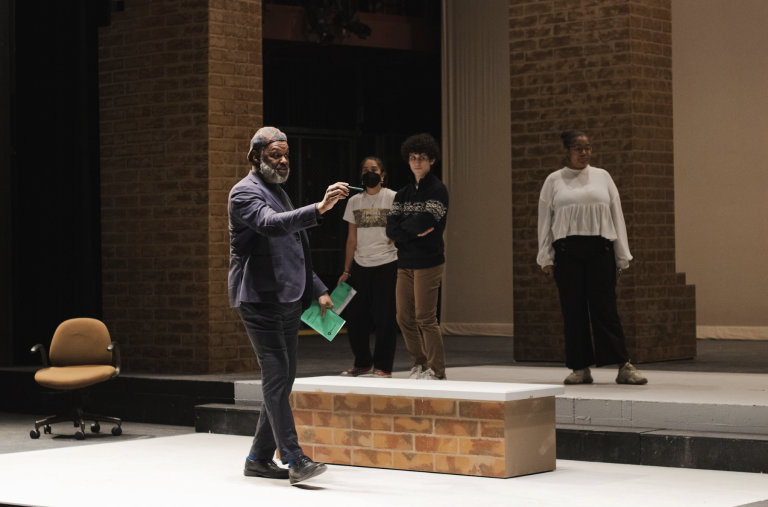Savannah Brooks ’26
Managing Editor
On Tuesday, March 26, senior Theater and Dance major Cassidy Willie-Lawes ’24 premiered her senior thesis, “The Pipeline,” a 10 minute play about the school-to-prison pipeline for Black youth. Directed, written and designed by Willie-Lawes, “The Pipeline” draws on her experience growing up in the Bronx school system.
“The Pipeline” is a short collection of scenes depicting the life of the main character, Anthony, through the characters Big Anthony (Chris Cooper ’23) and Little Anthony (Ahlon Moye) and their interactions with Teacher/Correctional Officer (Alex Garrian ’27). In this production, the audience enters by walking across the stage itself, watching Big Anthony sit across from them, forcing them to understand their role in the “pipeline” the title references. Once the play begins, Big Anthony watches as Little Anthony receives numerous rebukes from Teacher and is even suspended, all for relatively minor offenses such as coloring during class. These school scenes are punctuated with scenes in a prison, showing arguments between Big Anthony and Correctional Officer that directly parallel the offenses Little Anthony is scolded for.
The play ends with a scripted conversation between Cooper and Moye in which they discuss how the events in the show directly connect to events they, as Black youth, experienced in school growing up. The conversation then led to Willie-Lawes herself taking downstage center and, after pausing for applause, asking rhetorically: “Any questions?” before the lights went down.
“The Pipeline” demonstrated a deeply nuanced understanding of the psychological effects of primary school discrimination on Black youth in America. The production was quick-paced and sharp, with deep emotional beats happening almost on top of one another. Willie-Lawes’ writing, clever and provocative, shone through the actors’ deliveries, evoking a series of hushed noises from the audience at different points in the play. Willie-Lawes’ lighting design also lifted the production from its meager setting in the Performance Lab; at one point, Little Anthony sits, forlorn, as lights resembling prison bars strike his figure, condemning him to his future.
The production was grounded by a series of great performances, with Cooper in particular standing out as the contemplative Big Anthony. Cooper, a recent Trinity graduate, often searched Little Anthony visually as if begging for a change in circumstances or some kind of intervention. The actors were quick to respond to one another, forcing the audience to follow the action keenly or risk falling behind. The script, however, seemed to yearn for more emotional beats; times when the audience could consider the situation unfolding before them and digest Willie-Lawes’ ideas about the prison system and educators.
The pacing was the production’s largest pitfall; scenes began and ended so quickly it was difficult to consider how they impacted one another. Willie-Lawes built an extraordinarily compelling character in Anthony and placed him in a challenging setting, leaving the audience wanting more time with him as a person. While the ending scene that broke the fourth wall certainly left space for the audience to consider their role in educational race relations (especially considering the amount of white educators in the room), it seemed to take time away from Anthony’s life.
“The Pipeline” stands as a testament not only to Willie-Lawes’ immense skills as a writer and creator, but as a reminder of the criminalization of Black boys at a young age that ultimately pulls opportunities away from youth. Even while fighting against a technologically subpar space in the Performance Lab, Willie-Lawes was able to build an immersive, tender production that seemed to beg the audience to hear the Black youth who are so often left (or, perhaps, pushed) behind.





+ There are no comments
Add yours